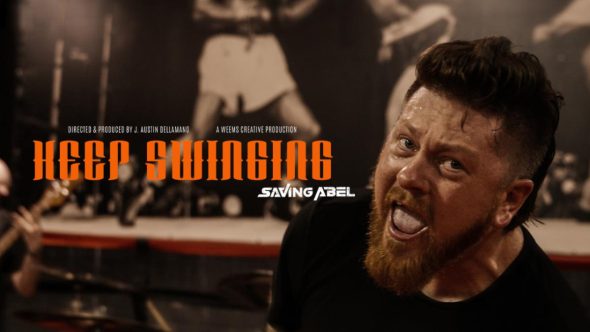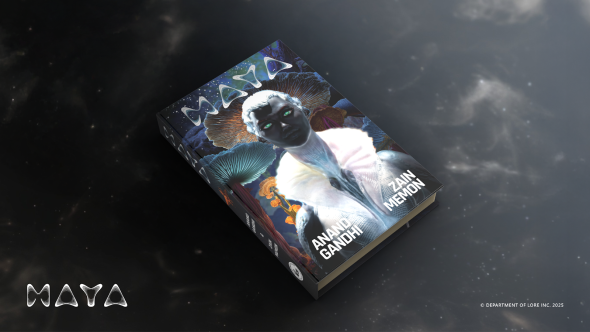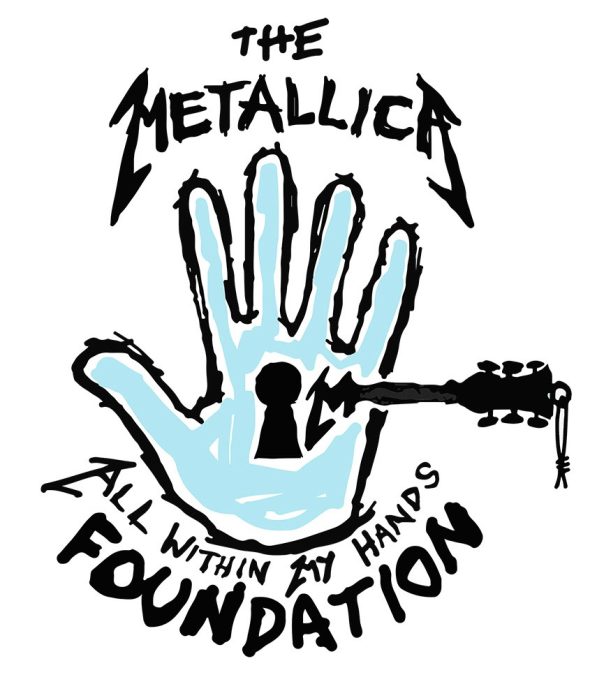Vocalist of Finger Eleven Scott Anderson is a regular guy in most every respect. He likes to hang out with his family and friends. He loves playing games, especially board games that some people would consider pretty nerdy. Anderson is remarkably down to earth, very honest and quite genial, despite being a rock star with Finger Eleven, which achieved Gold status in 2003 for its self-titled album and is growing again in popularity as the band tours this summer and will continue touring next year.
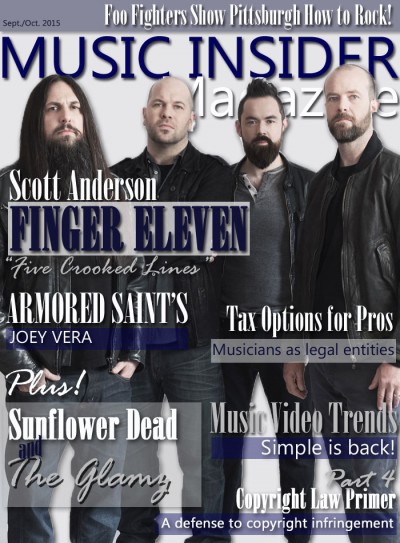
Finger Eleven’s latest release, “Five Crooked Lines,” is a standout album for the band. It was recorded over a very short period, taking only two weeks (15 days from start of recording to mixing) in the studio with Nashville-based producer, Dave Cobb, who has produced such acts as Shooter Jennings, Rival Sons and the Oak Ridge Boys. A strange selection for a producer by essentially a popular hard rock band from Canada, but on this album, the pairing of band and producer simply works.
For my money, this is the best sounding album the band has put out. The result of the recording and mixing sessions for this album are evident in a more live, raw sound than the band has previously achieved, and that rawness lends itself to projecting the live energy that the band exudes in spades during their performances. This band obviously is firing on all cylinders.
I chatted with Anderson after the band had just pulled into Peoria, Ill. for a concert one night, and being a drummer and a singer myself, I found it easy to relate to him, since both of us have moved out of the drummer’s seat to pick up a microphone to fill the needs of our respective groups. A week later, the band played closer to my neck of the woods in Springfield, Mo., and I caught their act (thanks for the tickets, Scott!) at the venerable Gillioz Theater in downtown Springfield. After the show, we sat down and talked about the band — where they came from and where they’re going.
Brian McKinny: The band formed in 1989 in Burlington (outside Toronto), Ontario, Canada. Who started the band, and how did you go about finding the right members?
Scott Anderson: I was in seventh grade, which puts me around 12 years old, and I saw this guy who could play “Sweet Child of Mine” on the guitar, and I just thought, “That’s the coolest thing I’ve ever seen!” So I had gotten hold of a second-hand drum kit, and I said to the guy, “Hey, we should get together on the weekend and play sometime!” And of course, that was James (Black, lead guitarist).
And then there was my brother Sean, the bass player in the band — he saw us playing together every weekend, and he eventually joined us. Then, when we were in high school, we found a “real” drummer, and I also found Rick (Jackett), who was just this guy who had long hair and wore tie-dyed shirts, and he listened to Hendrix, Steve Miller and The Grateful Dead, and that was all he listened to … So we all got together.
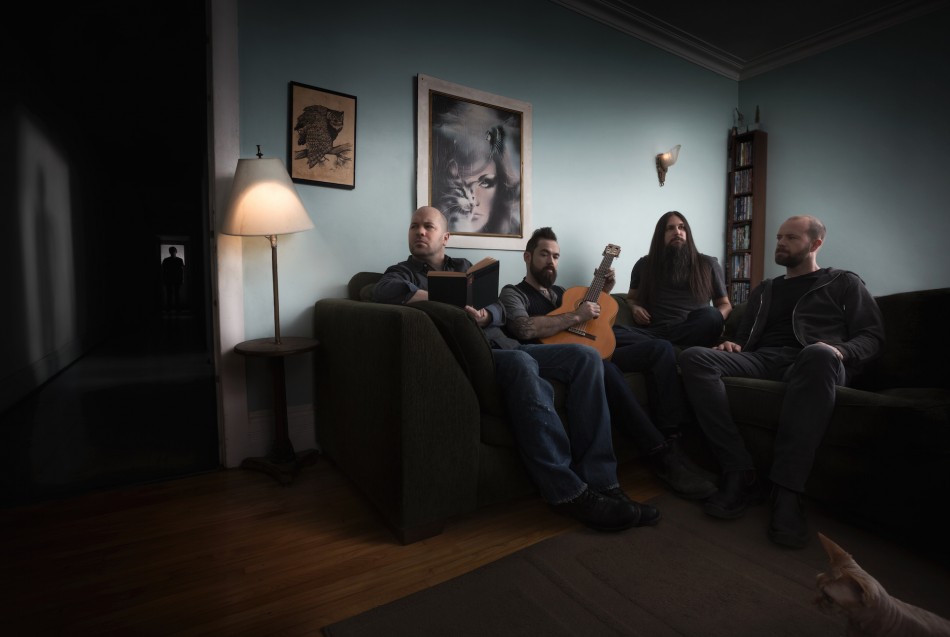
I had basically found such a good drummer that I bounced myself out of the drumming gig. But we didn’t have a singer, so I took that position. And that was our story from the beginning, and we’ve been working at making music ever since.
It’s funny, because back then I had gotten myself in a ton of hot water over the fact that I used to brag to Rick and his friends that “I have this drum kit at home, and it’s really cool, and you have to come check it out!” So one day they called me on it, “Okay, let’s come see your drum kit!”
So I showed them my drum kit, and I didn’t even have a proper stool … I just had two toms and a floor tom, and they didn’t even match. It looked like someone had wallpapered the shells! It was a complete second-hand patched-together jobber, and I used the edge of my bed as my stool. The guys were so underwhelmed when they saw this drum kit that I had kept bragging about — we were talking about it just the other day — and I still have yet to live that down. I remember it being a great sounding kit, but I’m sure it’s just my imagination.
McKinny: What’s behind the name Finger Eleven? Who came up with the name, and what does it mean?
Anderson: The name is my fault. What happened was, we were in the studio making music, and I had this verse in a song about “finger eleven pointing the other way,” and I was talking about doing your own thing, going your own way, despite what anybody might say or whatever obstacles are in your way, just doing your thing – it’s about following your instinct. It was a kind of nice, contrary feel.
We were changing sounds at that point, and it seemed very apropos with regard to our position. We took a lunch break, and I said, “That finger eleven line is really cool. We should use that as a band name,” and it stuck. I mean, there is this sort of vague philosophical meaning or attachment to the name, but it’s not the first thing most people think of. Everyone else’s interpretation is usually a little more rock and roll than the truth.
McKinny: That’s the cool thing about rock band names. They can mean whatever the fans think they mean, no matter what the truth may be of the real meaning behind the name.
Anderson: You can apply that to a lot of songs, too. Some of my favorite songs, you have no idea what they mean, or what they’re about. And sometimes when I find out what they do mean, I’m like, “That’s pretty cool, but my interpretation of its meaning is cooler.” You know, when I was 15 years old, and I fell in love for the first time, my attachment to a certain song was special. And that’s what I think is fun about music in general as well, because it can mean so many different things to so many people. With movies, there are only so many ways you can interpret the meaning, but with music, it’s a total open space. I don’t think any other medium has such a liberal palate to paint your own meaning onto.
McKinny: Your first U.S. charting hit was “One Thing” from your self-titled fourth album. How did your first three albums fare up in the Canadian markets, and what was it about your fourth album, in your opinion, that made it break through into the U.S. market?
Anderson: They did (hesitates)… OK. I’ll never forget when we put our first record out, I remember thinking, “Oh, this is going to be so easy! This record is so awesome, all we need to do is let people hear it, and everybody will fall in love with it.” And it just didn’t happen that way at all. In fact, we were dropped from our label just a couple of weeks into the record’s release, but that didn’t faze us at all. I’m not kidding! The band still had this kind of confidence where we thought, “Okay, there’s an easy way to do it, and a hard way to do it, so let’s just keep being a band and see what happens.”
So the second record came out, and then the third, and we got picked up by an American label — I’m sort of skipping steps here — we got dropped by the Canadian label, eventually got picked up by an American label, and then we lost our drummer and had to pick another one up …
So there were years of decent success. Canada’s always been really kind to us, but it wasn’t as if we had taken over Canada and were ready to invade and conquer whatever other territories we could go to. We had been across Canada a couple times touring, and we just thought, “Well, we have got to hit up some other places, too!” And at the behest of our American label, they like to keep us down there in America as well, and you can tour America a lot longer than you can in Canada — and still, to this day we’re a touring band; we like to tour. It was nice to have the albums that we believed in, but there’s a certain humility that comes with making an album, and there’s not that “instant success.”
There are bands that put out a record, and they have a huge song, and they expect the rest of their career to be exactly like that, but it very rarely ever is. So to us, as far as our “ups and downs” go, it’s all quite similar for us.
I remember specifically when “Paralyzer” hit number one, we were in Texas, and it was hot, and we were walking to lunch. And at the time, it was just a nice piece of good news. Having a big song can definitely take you to some cool places, but it’s not like we came down from Canada as big, giant stars or anything. We did OK in Canada.
McKinny: I was in a cover band in the mid-Atlantic region for several years called Smylin’ Jack, and we covered a couple of your songs. “One Thing” always got a great emotional response from the crowd, and “Paralyzer” would really get them into the show, up and dancing. How does it affect you, and the way you feel about the emotional interplay between you and the crowd when performing those songs?
Anderson: Isn’t it cool to see the reaction of what a song can do to people? I had intentions, as far as the meaning goes, behind our song, “One Thing,” and it was pretty simple. But people have some really touching stories that they’ve attached to that song, and they get really emotional when they hear that song, and they’ll sing it back to you with full force, and I still love it! I love it!
Actually, last night I got a little too excited, and I sang it like I was … I sounded a little over-zealous, and everybody probably thought I was drunk. It’s just that I was getting excited by how much feedback from the crowd I was getting, but I have to be careful not to fuck up that song. It still does it for me, you know? It’s that visceral reaction, and I’m sure you experienced it with your band as well while playing it. We play songs that people love to hear, and it’s a great feeling, isn’t it?
McKinny: Absolutely. I can understand 100 percent what happened with you during that last show, and maybe getting a little choked up. You feed off the crowd for their energy. That’s what keeps you going when you’re on stage, and you’re tired, out of breath and sweating through your clothes under the lights. I don’t think that most people realize how physically and emotionally taxing it can be to perform a show live, especially when you’re drawing off the crowd reactions to the music, and a song like “One Thing” really has that emotional quality that you can tap into for your performance.
Anderson: Yeah, I kind of shifted into my rough voice, and I don’t know if that’s what the audience wanted to hear or what they expected to hear, but that’s where the professional has to kick in. As you just mentioned, the last three shows were so hot, and we’re all sweating through our clothes, and the adrenaline kicks in, and my voice was giving me a bit of a hassle, but adrenaline takes care of pretty much everything that can go wrong, for at least that 45 minutes to an hour that you’re on stage, and you just deal with it later.
McKinny: While performing, have you ever experienced an unexpected physical limitation that could have or did affect your performance, maybe panicked you a little while it was happening, and how did you deal with that issue at the time?
Anderson: It’s the closest thing to a living nightmare that I’ve ever experienced. There are times when my voice just isn’t 100 percent, but you know you can get through it, and maybe I just have to concentrate a little more on my vocals that night. But I remember one show in particular when we were in Minneapolis years ago, and I did my normal warm-ups, and everything was fine. And then I get up on stage, and I’ve got nothing. I’m missing this huge spectrum of my voice — it’s just gone. I’m yelling and there’s nothing coming out.
And I’m up on stage, and I’ve got another hour and 15 minutes left to sing, so all my stage banter was like “Hey, thanks so much for coming! I don’t know what the hell has happened to my voice, but I’m going to do my best!” And the crowd was really nice. But you get that extra level of sweat, you feel like you’re letting everyone down, and this shouldn’t be happening … It’s absolutely terrible, man!
I try to take my voice pretty seriously. It’s great to have fun on the road and everything, but from the word go you have to hydrate; you have to drink your tea and do everything you can. And even still, you’re going to have issues, because you’re only human — sometimes you get sick or whatever.
But I thank my lucky stars every day that I’m a musician and not an athlete, because I think that fans of music are so much more forgiving than fans of sports. I mean, if you’re an athlete and you play football or hockey — I think that they’re usually injured and playing their entire season that way — but the fans are nowhere near as forgiving of athletes and their poor performances as music fans are.
Think about being on the road, and you’re away from home — you can even be staying in four-star hotels and have a shit sleep, just by virtue of your not being at home and sleeping in your own bed. And that’s road life — not just for musicians, but those athletes, too. The two audiences may be different, but for the performer and the athlete, they deal with the same kinds of physical issues.
But I still can’t stop thinking about that one night in Minneapolis. They were such a forgiving crowd.
McKinny: How do you use social media to get your brand and your music out to the masses, and do you think social media has helped or hurt the industry?
Anderson: James and Rick handle the social media stuff. But from my point of view, I don’t really use it. I’m probably a bit hypercritical about it, because I love nothing more than going out and connecting with our fans. But I think I used to be a lot more closed off (from the technology). If I’m on a big headlining tour, I have to preserve my voice for the performances, so I can’t go out to a bar and bullshit with everybody, but I really do genuinely enjoy doing that.
Like last night, for instance. We had some people that came to see the show, to see us specifically — we’re touring with Three Days Grace — and they were very nice people, and I just said “hi” to them, and they were like, “Hey Scott! How’s it going?” I was surprised that they even knew my name, and they bought me a beer and said that they had been to a couple of shows a couple of years ago, and that they’re so happy that we’re back out on tour, and that this concert was their anniversary present to themselves … So the point is I loved it. I thought it was great, and I feel like I should be doing that on a larger scale, meeting the people that make this all happen.
I mean, I love my technology. I’m a game nerd; I love all that stuff. So I get it, it’s so powerful. James and Rick use it a lot more than I do, but I think it’s important. It doesn’t matter what I think about it, because it’s here to stay, and it’s a great tool to connect with our fans. I just have to figure out how to stay comfortable it, and I’m taking my sweet-ass time going about it.
And here’s the real problem. I have some friends back home that are a little bit younger, and it’s a big group of them — let’s say, 15 or 20 people in this specific group — and I’ve missed a couple of parties because they announce them on Facebook, and whose fault is that? Mine, because I’m not on Facebook!
Nobody writes personal invitations anymore, so I really have to get my ass in gear if I want to get in on these parties. But James and Rick do a lot more online — they take pictures every night. There’s talk of “periscoping” the bus and stuff, and it makes me fucking cringe. I mean, I don’t know how much access people are supposed to have … Do you really want to watch me just sitting here drinking my coffee? I’m really not that cool or exciting to watch, when I’m not on stage. It just seems a little intrusive at that point, and a bit absurd, but hey… That’s what life has become.
I know, I’ve got a bit of a bad attitude about it, and I’m trying to change that. And here’s the real truth: I don’t think anyone really gives a shit. I mean, it’s not like there’s a bunch of paparazzi outside the bus waiting for us to jump off! It’s more like, “Oh yeah, remember that fucking band?” (Laughing) But I hope the new record reminds everybody that we haven’t gone away, that we are still around, you know? I hope the new record turns a few heads, because we’re really quite proud of it.
McKinny: Your latest release, “Five Crooked Lines,” came out on July 31st, and the first single, “Wolves and Doors” was released on July 3rd. So far, how has it been received by the critics, and what has been the response of your fans to the new album?
Anderson: Well, the first single is out, and it’s doing really well. We’re on tour now with Three Days Grace through the summer, but we’re really going to tour like crazy next year. I just don’t want people to not be aware of the fact that we have a new record out and that we’re touring. Our last record fell into that trap, and I don’t want that to happen this time.
McKinny: Are you co-headlining with Three Days Grace, or are you playing in support of their tour at the moment?
Anderson: No, they’re headlining, and fuck, they have a gigantic fan base that is very kind to us on tour! This isn’t a co-headlining situation. Maybe next year, we’ll see. When you stack all of their songs in an hour-and-a-half format, it’s kind of unstoppable! You’re like, “Oh, I know that one! Oh, wait, I know that one, too!”
So, it’s neat when you go see a band that has a couple of hits, but no, these guys have tons of hits, and the new guy (singer) is working out far better than some people might have expected — I mean he’s really, really good, and they put on a great show.
McKinny: Any closing thoughts or points you want to make?
Anderson: I just think that we’re finally back on the road after a bit of a hiatus, and the band is really happy — happy to reconnect with anybody who gave a shit about the band and our music, so I think it’s going to be a really fun year, and I hope that the people will give the new record a chance, because we’re really quite proud of the work we put into making it, and the final result is pretty gratifying. We hope our fans feel the same way.


